In professional sports, trained personnel are ready to respond if there’s a medical event. But what about at your child’s sporting events? Here, we share some easy ways to prepare in case of a health emergency.

What is sudden cardiac arrest?
Sudden cardiac arrest is when the heart stops working, and while it’s rare in young, healthy athletes, it can happen. When a cardiac emergency occurs, parents may become concerned about letting their own kids participate in sports.
Matthew Martinez, MD, director of Atlantic Health System Sports Cardiology at Morristown Medical Center, reminds us that “exercise is medicine” and the benefits of playing sports far outweigh the risks. However, bystanders, parents, friends, family and fans can all become first responders by learning cardiopulmonary resuscitation (CPR) and how to use an automated external defibrillator (AED).
“When it happens, you are either prepared, or it could be a potential catastrophe,” says Dr. Martinez. “What you should be asking yourself is, how can I make myself better equipped? How can I learn CPR? Do we have a defibrillator? Do I know how to run it? Does each of my personnel have a plan? Has our team practiced the plan so we can execute it flawlessly?”
Have an Emergency Action Plan (EAP)
Typically, an EAP outlines how to give emergency care if an athlete experiences a serious injury, or cardiac arrest, and requires planning, preparing, practicing and executing critical steps such as:
- Calling 911
- Starting CPR compressions
- Finding the AED
An EAP helps prepare coaches, parents and other staff to respond in the most effective way. Check to see if your school or athletic facility has a plan, and if it is reviewed and practiced regularly.
Learn CPR
CPR can save lives. Using hands-only CPR and an AED more than doubles a person’s chance of survival.
“Early CPR is absolutely critical to improve outcomes,” says Dr. Martinez. “It allows circulation and oxygen to get to the brain and the other vital organs while waiting for emergency medical help to arrive.”
As Dr. Martinez explains in the video, CPR is easy to learn and an important way to ensure the health and safety of athletes.
Know how to use an AED and where it’s located
A critical component to CPR training is knowing how to use an AED on a person in cardiac arrest. An AED gives step-by-step instructions an electric shock to a person’s heart, helping it start beating again. Many facilities are required to have an AED, so it’s important to know how to locate yours.
Find CPR/AED training near you
“CPR and AEDs are a critical part of how we can all improve the health and safety of our communities,” explains Dr. Martinez. “It’s easier than you think, it doesn’t take long to learn, and it doesn’t take a full-day course to get familiar with how to start hands-only CPR, call 911 and find a defibrillator.”
CPR training is available through several organizations, including the American Red Cross.
“Anyone can be a first responder,” says Dr. Martinez. “Whether you are a teacher, student, an athlete, a coach, a referee or anyone else, the opportunity is there to help save a life.”
Be Proactive About Heart Health
Another way to be prepared is understanding your own heart health. Stay up to date with your annual visits to prevent and detect more serious issues and learn about the risk factors for heart disease.
Related Articles
Your Healthy Summer Guide
Atlantic Health System is your healthy summer guide to a safe and fun season. From helpful tips to preventive and urgent care, we've got you covered for whatever summer brings.
If It Hurts, Don't Play Through the Pain
Playing sports when you’re hurt is never a good idea, especially for young people whose bodies and brains are still developing. Pain from any injury is the body’s way of telling us to rest and recover. Here’s how to make sure your child is playing it safe.
Help! Where Should I Take My Child for Care?
Unexpected accidents and illnesses happen all the time – so make sure you know where to go when a health emergency strikes.
Safety Tips for Exercise in the Summer Heat
Even seemingly gentle activities can lead to unexpected injuries. Learn helpful tips for preventing injury when exercising in the summer heat.
Hands-Only CPR is Key To Saving Lives
Matthew W. Martinez, MD, director of Atlantic Health System Sports Cardiology at Morristown Medical Center, and Cardiology Today Editorial Board Member, participated in a Q&A with health news website Healio about why bystander CPR and AED use is so important,
Take a Heart Health Assessment
The first step to a healthier heart is understanding your risk for heart disease. Answer a few questions about your heart health and history to get your individual results.






